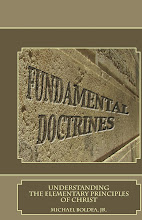The second example I want to highlight is that of Paul’s conversion on the road to Damascus. It is no doubt, that Paul was converted on the road to Damascus. The question that remains to be asked is, did he also receive the Holy Spirit upon his conversion?
Biblical answer, no he did not. Paul received the Holy Spirit three days later, through the ministry of Ananias.
Acts 9:17, “And Ananias went his way and entered the house; and laying his hands on him he said, ‘Brother Saul, the Lord Jesus, who appeared to you on the road as you came, has sent me that you may receive your sight and be filled with the Holy Spirit.”
There are more examples to be had, but alas time does not permit us to go into them. I do hope that we’ve established this truth, as self-evident by way of scripture, that conversion and the baptism of the Holy Spirit are not one and the same, but rather two very different experiences.
Another misconception that we must dispel, is that the baptism of the Holy Spirit is sanctification. The baptism of the Holy Spirit is not sanctification. Yes, sanctification is a work of the Holy Spirit, but the baptism of the Holy Spirit and sanctification are two individual works.
Sanctification is a manifestation of the grace of God, which presents itself in two different ways. First, is instant sanctification due to the word of God, and second is progressive sanctification, a process, by which an individual is sanctified.
Now lest you label me a heretic, both of these means of sanctification are found in the Word, and I want to go through a couple of the Bible passages just so that there be no doubt on your part.
It is none other than Jesus who speaks of instant sanctification, as He says the following to His disciples in John 15:3, “You are already clean because of the word which I have spoken to you.”
Jesus did not say that they were in the process of becoming clean, that they would become clean, but rather that they were already clean because of the word which He had spoken to them.
There are also scriptures in the Bible that support progressive sanctification, and I will quickly go through a few just to establish this truth in your heart.
1 Thessalonians 5:23-24, “Now may the God of peace Himself sanctify you completely; and may our whole spirit, soul, and body be preserved blameless at the coming of our Lord Jesus Christ. He who calls you is faithful, who also will do it.”
Hebrews 6:1, “Therefore, leaving the discussion of the elementary principles of Christ, let us go on to perfection.”
So in both Thessalonians, and Hebrews, Paul speaks of a progressive sanctification. Whether going on to perfection, or being sanctified completely, both of these terms signify a work in progress, and ongoing process that had not as yet been completed. Whether through instant sanctification, or progressive sanctification, it is God’s choosing how we will be sanctified. The point of it all is that sanctification, and the baptism of the Holy Spirit, are not one and the same work.
Yet another misconception about the baptism of the Holy Spirit is that it is somehow a reward. I have heard it often, from different men over the years that the baptism of the Holy Spirit is a reward for the years of service one puts in as a disciple of Christ, and that it represents the pinnacle of the Christian experience. Some also share the false misconception that the baptism of the Holy Spirit somehow marks an individual as having achieved a superior state of spirituality. Both of these opinions are untrue, and have no basis in scripture. The word tells us that the baptism of the Holy Spirit is the promise of the Father, and Peter, while speaking to a large crowd that had assembled before him states that after being baptized in water, they would receive the gift of the Holy Spirit.
Acts 2:38, “Then Peter said to them, ‘repent, and let everyone of you be baptized in the name of Jesus Christ for the remission of sins; and you shall receive the gift of the Holy Spirit.”
Peter didn’t say that they would have to wait for years, he did not say they would have to prove themselves first, he told those that had been cut to the heart at hearing his words, that they must repent, be baptized in the name of Jesus Christ for the remission of sins, and then they would receive the gift of the Holy Spirit.
Within this same passage of scripture, we also see that the outpouring of the Holy Spirit, the Baptism of the Holy Spirit was not exclusive to the day of Pentecost as some continue to affirm.
Acts 2:39, “For the promise is to you and to your children and to all who are afar off, as many as the Lord our God will call.”
So what Peter is saying is that the promise, the gift of the Holy Spirit was not exclusive to that day, or to that generation, but even to their children, and all who are afar off, meaning those many years from now, as many as the Lord God will call. The fact that certain individuals educated beyond their intelligence still continue to deny the actuality of the baptism of the Holy Spirit, and the work of the Holy Spirit for today never ceases to astound me. All I can say is that just as the sacrifice of Christ Jesus is eternal, able to restore, and reconcile men unto God from generation to generation, the baptism of the Holy Spirit is likewise a perpetual experience.
There is one more misconception I would like to clear up, and that is the affirmation that the baptism of the Holy Spirit is a collective experience. Once again, biblically speaking, the baptism of the Holy Spirit is not a collective experience but an individual one.
Although there were one hundred and twenty people in the upper room awaiting the promise, although they experienced the baptism of the Holy Spirit at the same time, the tongues as of fire appeared and sat upon each of them individually.
Acts 2:4-5, “Then there appeared to them divided tongues, as of fire, and one sat upon each of them. And they were all filled with the Holy Spirit and began to speak with other tongues as the Spirit gave them utterance.”
The baptism of the Holy Spirit is a personal and intimate experience, it is not shared collectively but rather God searches the individual heart, and pours out His Holy Spirit individually.
Oddly enough, it would seem that during the last two posts we dealt with what the Holy Spirit is not, with the misconceptions surrounding the baptism of the Holy Spirit, and the varied false doctrines that continue to plague the church. And so, during the next posts we will continue this discussion on the baptism of the Holy Spirit, discover by way of the Word what it is, the purpose and necessity of the baptism of the Holy Spirit, who the baptism of the Holy Spirit is for, the conditions we must meet in order to receive this precious gift, and if we have time, what the evidence and the results of receiving the baptism of the Holy Spirit are.
With love in Christ,
Michael Boldea Jr.
Tuesday, June 21, 2011
Subscribe to:
Post Comments (Atom)













1 comment:
Thank you for your teachings on the Holy Spirit. I also believe that Churches, Pastors and Teachers do not spend enough time teaching on the PERSON of the Holy Spirit. He is the Third Person in the Trinity. He is not an "it," He is just as real as the Father and the Son. I heard it said as an example, "I am a husband to my wife; a father to my children and a pastor to my church...same person, but three different roles." Our relationship with the Father, Son and Holy Spirit are the same way. Three different, unique personages, but still ONE.
Thank you again.
Pastor Bob Thibodeau
Freedom Through Faith Ministries
Post a Comment